外研版七年级英语下册Module11单元练习题
外研七下Module 11单元测试题及答案
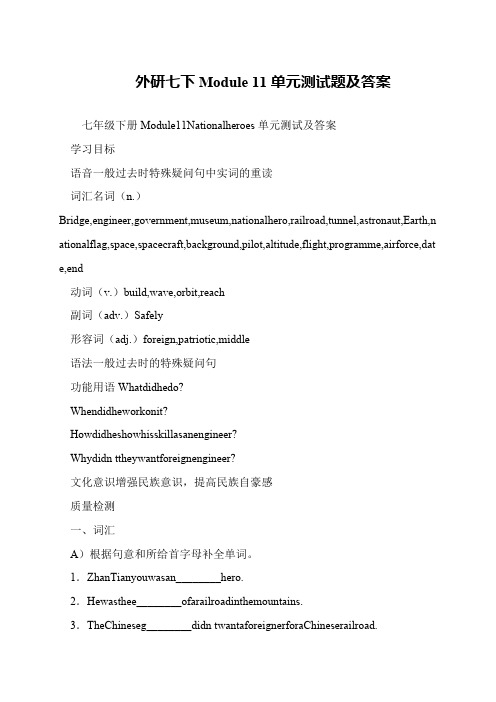
新外研英语七年级下Module11模块测试卷含答案
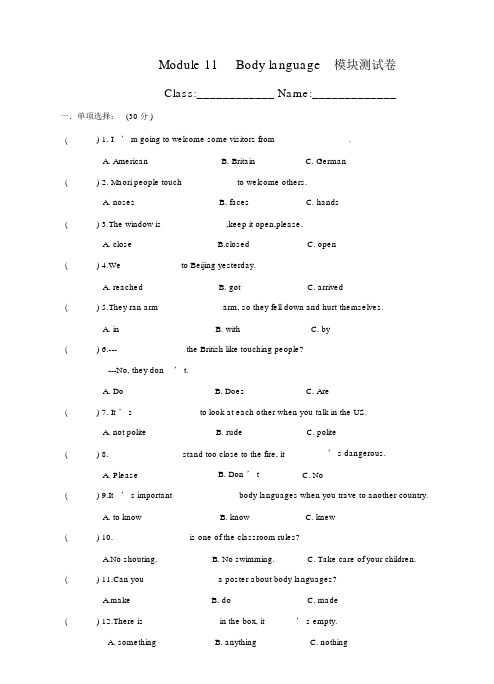
Module 11 Body language模块测试卷Class:____________ Name:_____________一.单项选择:(30 分 )() 1. I ’ m going to welcome some visitors from________________.A. AmericanB. BritainC. German() 2. Maori people touch____________to welcome others.A. nosesB. facesC. hands() 3.The window is______________,keep it open,please.A. closeB.closedC. open() 4.We_____________to Beijing yesterday.A. reachedB. gotC. arrived() 5.They ran arm______________arm, so they fell down and hurt themselves.A. inB. withC. by() 6.---_______________the British like touching people?---No, they don’ t.A. DoB. DoesC. Are() 7. It ’ s ______________to look at each other when you talk in the US.A. not politeB. rudeC. polite() 8.________________stand too close to the fire, it’ s dangerous.A. PleaseB. Don ’ tC. No() 9.It ’ s important ______________body languages when you trave to another country.A. to knowB. knowC. knew() 10.________________ is one of the classroom rules?A.No shouting.B. No swimming.C. Take care of your children. () 11.Can you________________a poster about body languages?A.makeB. doC. made() 12.There is____ ____________in the box, it’ s empty.A. somethingB. anythingC. nothing( () 13.Say_________________to your parents when you get home every day.A. helloB. goodbyeC. nothing) 14.The Japanese bow is a way of____________ ___polite and showing respect.A. beB. isC. being() 15.Give______________more personal space, he’ s not a child any more.A. themB. himC. his二.完形填空:(10 分)__1__important to know some body languages__2__you want to go to another __3__.For example,you can stand close __4__ people in the Middle East, but don ’ stand __5__close to NorthAmerican. Give them more personal space. __6__ girls often walk arm in arm with __7__ friends.Sometimes South American hold your arm when they talk to you, __8__ you can’ t move away. Please __9__careful! In Greece, it’ s not at all polite! In fact , It’ s very __10__. () 1.A. It B. It ’ s C. Its() 2.A. when B. where C. whose() 3.A. country B. countries C.city() 4.A. for B. to C. with() 5.A. too B. to C. two() 6.A.Chinese B.China C. America() 7.A. my B. our C. their() 8.A. and B.so C. but() 9.A. is B. be C. being() 10.A. polite B. rude C. happy三.判断正误:正确的写A,错误的写 B.(10分 )Once upon a time, there was a man who wanted to steal(偷 ) his neighbor’ s doorbell. However, heknew clearly that the bell would ring and c atch the other people’ s attention as long as he touchedthe bell. So he thought hard and suddenly had a clever plugged“h isdears”with.Hesomething,thinking that everything would go well when he stole the bell. Unluckily, the bell still rangloudly and he was caught on the spot as a thief.()1. The man wanted to steal his neighbor’ s money.()2.He wasn’ t afraid of catching the other people’ s attention.( ( ()3.The word plug in Line 3 means塞住“” in Chinese. )4. The man was caught on the spot as a thief at last. )5. The man is very clever.四.阅读理解:(10 分)In America when people meet each other for the first time, they talk about things like weather,family, work, school, or sports. They ask questions like“ Do you have any brothers or sisters?“ Where do you work?”“ What school do you go to?”and“ Do youTheylike alssp o rts?ask”questions like“ Where do you come from?” and“ Where do you live?” These are polite questi not personal questions.But some things are personal or private, and questions about them are not polite. People donask questions about a person ’salary (薪水 ). They don ’ task how much someone paid something. It is OK to ask children how old they are, but it is not polite to ask older people aboutfortheir age. It is also not polite to ask people questions about politics (政治 ) or religion (宗教 ) if youdon ’ t know them very well. People don’ t ask unmarried people“ Why are you single?”don ’ t ask a married couple withno children“ Why don’ t you have any children? ()1. The writer wants us to.A. be very friendly to people from AmericaB. find out a lot about AmericaC. know what questions are polite in America()2. According to this article, when you meet Americans, it is OK to ask them about their.A. average salaryB. favor ite sportsC. religious beliefs()3. When you meet Americans for the first time, the question such aspolite”is NOTA.“ Do you come from a big family?”B.“ Do you like playing baseball?”C.“ How much did your shoes cost?”()4. In Amer ica, it’ s OK to discuss politics with.(A. married couples ( 已婚夫妇 ))5. In America it is OK to ask aA. childB. manB. good friendsC. older peoplehow old he/she is.C. woman五.根据首字母及句意完成句子,每空一词。
外研版七年级下册Module11模块综合测试卷

外研版七年级下册module 11模块测试卷一、单项选择(每题1分,共10分)1.How about ______ out for a walk.A. goB. goesC. goingD. to go2.Of course,this is just a opinion.A.personalB.importantC.difficultD.strange3.—do the Chinese people say hello to each other they meet?—They shake hands with each other.A.How;howB.What;whenC.How;whenD.What;how4.There are some _____ in the shop and they want to buy some Chinese products.A. GermansB. IndianC. AmericanD. Englishman5.careful! cross the road when the traffic light is red.A.Be;NotB.Be;D on’tC.Do;Can’tD.Do;Don’t6.I came to ____ goodbye to you. I have to go now.A. talkB. tellC. speakD. say7.It is impolite _____ people in some places.A. look atB. looking atC. looks atD. to look at8.Both the _____ and the _____ a re our friends.A. English, RussiaB. British, RussianC. British, RussiaD. England, Russians9.When you go to a party for ____________ first time, you should arrive there on ________ t ime.A./; / B.the; theC.a; the D.the; /10.My computer is different ________ y ours, but it is the same _________ hers. A.from; from B.as; asC.as; from D.from; as二、完形填空(每空1分,共10分)We use body language to send messages to others.It is very 1. because others can understand you easily when you use body language.When you are talking with others,you are not just using words,but also using 2..For example,waving one’s hand is to say “Good-bye”.Shaking hands means welcome,and clapping hands 3. congratulations(祝贺).Nodding the head means YES,but shaking the head means NO.Different countries have 4. body language.For example,when in 5.,France and Arab countries,people kiss each other when they meet,6. men in China or Australia shake hands.People in Puerto Rico like touching each other,but people in Britain do not touch each other.People in Arab countries like 7. close to one another when they are talking,but English people must keep a distance away when they are talking.It is very important 8. the meanings of gestures and movements in the foreign country 9. they will help you communicate with people and make you stay there much more 10. and comfortable.1.A.helpful B.difficult C.easy eless2.A.words B.gestures C.handshakes D.hands3.A.to mean B.mean C.means D.meaning4.A.the same B.a same C.the different D.different5.A.Russia B.the Russia C.Russian D.a Russia6.A.and B.or C.but D.so7.A.stand B.stands C.sit D.standing8.A.knowing B.know C.to know D.knows9.A.when B.because C.so D.if10.A.important B.sad C.interesting D.pleased三、阅读理解(每题2分,共26分)APeter is ten years old. One day his friend Paul says to him, “ I’m going to have a birthday party on Saturday. Peter, would you like to come?” Peter asks his mother, and she says, “Yes, you can go.”Before Peter goes to the party on Saturday afternoon, his mother says to him, “Peter, remember to be polite(有礼貌的).Don't ask for food. Wait until(直至U ................................................................................................................................. 才)someone gives it to you.” “All right, Mum.” Then Peter goes to Paul’s home on his bike.There are a lot of children at the party. They play together for an hour, and then Paul’s mother gives them some food, but she forgets to give Peter any. He waits politely and then he holds(举起)his plate(盘子)up and says loudly(大声地),“ Does anyone want a nice clean plate?” 1. Paul asks Peter to .A. a friend’s birthday partyB. a friend’s evening partyC. his birthday partyD. Peter’s birthday party2.Which is wrong?A.Peter goes to the party by bike.B.Paul asks many children to the partyC.Paul’s mother gives every child some foodD.Peter is polite3.Peter asks the question loudly because _______ .1.He is so happy B. he forgets his mother’s wordsC. he eats all his foodD. he wants to get food in a polite way(方式)BIn America when people meet each other for the first time, they talk about things like weather, family, work, school, or sports. They ask questions like “Do you have any brothers or sisters?” “Where do you work?” “What school do you go to?” and “Do you like sports?” They also ask questions like “Where do you come from?” and “Where do you live?” These are polite questions, not personal questions.But somethings are personal or private, and questions about them are not polite. Peopledon’t ask questions about a person’s salary (薪水). They don’t ask how much someone paid for something. It is OK to ask children how old they are, but it is not polite to ask older people about their age. It is also not polite to ask people questions about politics (政治)or religion (宗教)if you don’t know them very well. People don’t ask unmarried people “Why are you single?” and they don’t ask a married couple with no children “Why don’t you have any children?” 4. The writer wants us to.A. be very friendly to people from America8.find out a lot about America9.know what questions are polite in America D.know what we should do in America10.A ccording to this article, when you meet Americans, it is OK to ask them about their.A. average salaryB. favorite sportsC. religious beliefsD.age11.W hen you meet Americans for the first time, the question such as is NOT politeA. “Do you come from a big family?”B. “Do you like playing baseball?”C. “How much did your shoes cost?”D.”What did you eat for breakfast?”12.I n Amer ica, it's OK to discuss politics with.A. married couples (已婚夫妇)B. good friendsC. older peopleD.colleagues13.I n America it is OK to ask a how old he/she is.A. childB. manC. womandyCBefore you go to another country it is a great help if you know the language and some of the customs(风俗)of the country. When people meet each other for the first time in Britain, they say “How do you do? ” and shake hands(握手). Usually they do not shake hands when they just meet or say goodbye. But they shake hands after they haven’t met for a long time or when they will be away from each other for a long time. Last year a group of German students went to England for a holiday. Their teacher told them that the English people hardly shake hands. So when they met their English friends at the station,they kept their hands behind their backs. The English students had learned that the Germans shake hands as often as possible,so they put their hands in front and got ready to shake hands with them. It made both of them laugh.14.I t is ____ if you know the language and some of the customs of the country.A. not usefulB. not helpfulC. very usefulD. very hard15.English people usually shake hands when they ______ .A. meet every timeB. meet for the first timeC. say goodbye to each otherD. say hello to each otherually English people don’t shake hands ___ .A.when they will be away for a long timeB.when they say “How do you do? ”C.when they just meet or say goodbyeD.after they haven’t met for a long time17.Which is RIGHT?A.German people shake hands as often as possible.B.English people like shaking hands very much.C.German people hardly shake hands.D.Neither English people nor Germans like shaking hands.18.This story is about ____ .A. shaking handsB. languageC. customsD. language and customs四、选词填空(每空1分,共12分)walk, wrong, two, funny, different, language care, left, green, busy, bus, trafficDifferent countries are 1 ___________ i n many ways, such as eating habits, body2 __________ , and so on. Let’s learn something about the traffic rules.When you are in England, you must be very 3 ___________ in the streets because the traffic drives on the4 __________ . Before you cross a street, you must look to the right first and then the left. If the traffic lights are 5 ______________ , the traffic can go. People who are 6 ________ mustn’t cross. In the morning or in the evening when people go to or come back from work, the streets are very 7 _______________ . Traffic is most dangerous then. When you go by 8 ______________ in England, you have to be careful, too. Always remember the 9 ________ moves on the left. Have a look first or you will go the 10 ________ way. In many English cities, there are big buses with two floors. You can sit on the 11 ________ floor. From there you can see the city very well. It’s very 12________ .五、根据汉语提示完成句子(每题2分,共10分) 1.这个大厅只能容纳这么多人。
(外研社版)初中英语七年级下册 Module 11单元测试(一)附答案
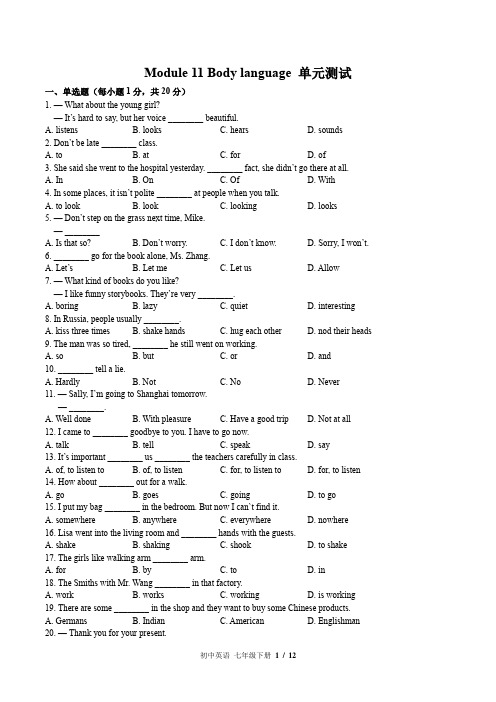
Module 11 Body language 单元测试一、单选题(每小题1分,共20分)1. — What about the young girl?— It’s hard to say, but her voice ________ beautiful.A. listensB. looksC. hearsD. sounds2. Don’t be late ________ class.A. toB. atC. forD. of3. She said she went to the hospital yesterday. ________ fact, she didn’t go there at all.A. InB. OnC. OfD. With4. In some places, it isn’t polite ________ at people when you talk.A. to lookB. lookC. lookingD. looks5. — Don’t step on the grass next time, Mike.— ________A. Is that so?B. Don’t worry.C. I don’t know.D. Sorry, I won’t.6. ________ go for the book alone, Ms. Zhang.A. Let’sB. Let meC. Let usD. Allow7. — What kind of books do you like?— I like funny storybooks. They’re very ________.A. boringB. lazyC. quietD. interesting8. In Russia, people usually ________.A. kiss three timesB. shake handsC. hug each otherD. nod their heads9. The man was so tired, ________ he still went on working.A. soB. butC. orD. and10. ________ tell a lie.A. HardlyB. NotC. NoD. Never11. — Sally, I’m going to Shanghai tomorrow.— ________.A. Well doneB. With pleasureC. Have a good tripD. Not at all12. I came to ________ goodbye to you. I have to go now.A. talkB. tellC. speakD. say13. It’s important ________ us ________ the teachers carefully in class.A. of, to listen toB. of, to listenC. for, to listen toD. for, to listen14. How about ________ out for a walk.A. goB. goesC. goingD. to go15. I put my bag ________ in the bedroom. But now I can`t find it.A. somewhereB. anywhereC. everywhereD. nowhere16. Lisa went into the living room and ________ hands with the guests.A. shakeB. shakingC. shookD. to shake17. The girls like walking arm ________ arm.A. forB. byC. toD. in18. The Smiths with Mr. Wang ________ in that factory.A. workB. worksC. workingD. is working19. There are some ________ in the shop and they want to buy some Chinese products.A. GermansB. IndianC. AmericanD. Englishman20. — Thank you for your present.— ________.A. It doesn’t matterB. Not at allC. Don’t say thatD. The same to you二、完型填空(每小题1分,共10分)It is said that eyes can speak. Do you have 21 a kind of experience? In a bus you may look at a stranger, but not too 22 . If he notices that he is being looked at, he may 23 uncomfortable. It is the same in daily life.When you are looked at for several more times, you will look 24 up and down in order to 25 if there is anything wrong with you. If 26 goes wrong, you will feel angry with the person who is looking at you. 27 can speak, right?Looking too long at someone may seem to be impolite. But sometimes things are 28 . If you wish to draw someone’s 29 , you may look at him or her more than ten seconds. For lovers, they enjoy looking at each other longer to show the love that words cannot 30 . Clearly, eye communication should be done according to the relationship between the two people and the certain situation.21. A. so B. such C. very D. quite22. A. late B. long C. low D. loud23. A. feel B. smell C. sound D. taste24. A. itself B. himself C. myself D. yourself25. A. see B. guess C. hear D. expect26. A. something B. nothing C. everything D. anything27. A. Ears B. Eyes C. Mouth D. Nose28. A. different B. difficult C. tiring D. boring29. A. direction B. lesson C. attention D. trouble30. A. write B. print C. read D. express三、阅读理解(每小题2分,共20分)(A)Can you speak English? Maybe you know a lot of English words. You can read, speak and understand English, but there is another kind of language — the language of the body. All over the world, people “talk” with their hands, their heads, and their eyes. When Japanese people meet, they bow. When Indians meet, they put their hands together. When British and American people meet someone for the first time, they shake hands. They do not usually shake hands with their friends. Women sometimes kiss their women friends, and men kiss women friends on the cheek(脸颊). When a man meets a man friend, he just smiles, and says “Hello”. Men do not kiss each other, or hold hands. Even fathers and sons do not often kiss each other.31. From the passage we know it is important to ________.A. know English wordsB. read and write EnglishC. know body languageD. greet(问候) others32. When Indians meet for the first time, ________.A. they bowB. they shake handsC. they kiss their friendsD. they put their hands together33. In America, it is NOT right for men to ________.A. kiss women friends on the cheekB. smile to men friendsC. say “Hello” to men friendsD. kiss men friends34. In America, when a man meets a man friend, he usually ________.A. shakes handsB. says “Hello”C. says “How do you do”D. kisses him35. Which of the following is body language?A. Read English.B. Wave hands to stop a taxi.C. Talk with a man.D. Listen to music.(B)When people meet each other for the first time in Britain, they say “How do you do and shake hands. Usually they do not shake hands when they just meet or say goodbye. But they shake hands after they haven’t met for a long time or when they will be away from each other for a long time.Last year a group of German students went to England for a holiday. Their teacher told them that the English people hardly(几乎不) shake hands. So when they met their English friends at the station, they kept their hands behind their backs. The English students had learned that the Germans shake hands as often as possible, so they put their hands in front and got ready to shake hands with them. It made both of them laugh.36. It is ________ if you know some of the customs(风俗) of the country.A. not usefulB. not helpfulC. very helpfulD. very bad37. English people usually shake hands when they ________.A. meet every timeB. meet for the first timeC. say hello to each otherD. say goodbye to each other38. Usually English people don’t shake hands ________.A. when they will be away for a long timeB. when they say “How do you do?”C. when they just meet or say goodbyeD. after they haven’t met for a long time39. Which is RIGHT?A. German people shake hands as often as possible.B. English people like shaking hands very much.C. German people hardly shake hands.D. Neither English people nor Germans(英国人和德国人双方都不) like shaking hands.40. This story is about ________.A. shaking handsB. languagesC. customsD. languages and customs四、根据首字母、句意及汉语提示写出所缺的单词(每小题1分,共5分)41. We often s________ hands with visitors in China.42. The boy pointed to the red apple with his f________.43. A new f________ student is going to study in our school.44. It’s p________ to give your seat(座位) to the old on the bus.45. Don’t t________ the water. It’s too hot.五、用所给单词的正确形式填空(每小题1分,共5分)46. — What are you doing?— I’m ________ (welcome) the new classmates with my friends.47. In some countries, “________ (nod) your head” means that you say “yes”.48. Who will come to show these ________ (visit) around our school?49. Russian people usually kiss three ________ (time) when they meet.50. Parents and ________ (child) should find more time to spend together.六、完成句子,每空一词(每小题1.5分,共7.5分)51. 对老师要礼貌。
外研英语七年级英语下册单元测试题及答案(Module11)
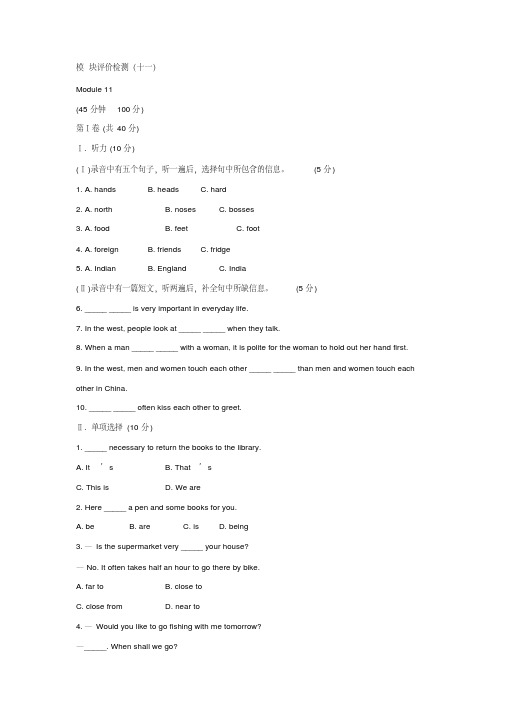
模块评价检测(十一)Module 11(45分钟100分)第Ⅰ卷(共40分)Ⅰ. 听力(10分)(Ⅰ)录音中有五个句子,听一遍后,选择句中所包含的信息。
(5分)1. A. hands B. heads C. hard2. A. north B. noses C. bosses3. A. food B. feet C. foot4. A. foreign B. friends C. fridge5. A. Indian B. England C. India(Ⅱ)录音中有一篇短文,听两遍后,补全句中所缺信息。
(5分)6. _____ _____ is very important in everyday life.7. In the west, people look at _____ _____ when they talk.8. When a man _____ _____ with a woman, it is polite for the woman to hold out her hand first.9. In the west, men and women touch each other _____ _____ than men and women touch each other in China.10. _____ _____ often kiss each other to greet.Ⅱ. 单项选择(10分)1. _____ necessary to return the books to the library.A. It’sB. That’sC. This isD. We are2. Here _____ a pen and some books for you.A. beB. areC. isD. being3. — Is the supermarket very _____ your house?— No. It often takes half an hour to go there by bike.A. far toB. close toC. close fromD. near to4. — Would you like to go fishing with me tomorrow?—_____. When shall we go?A. That’s all rightB. That’s rightC. RightD. All right永州中考) _____ get off the bus before it stops.5. (2012·A. Don’tB. Doesn’tC. Didn’t6. They entered the room _____.A. arm with armB. arm to armC. arm in armD. arm on arm7. My friend _____ the book with him when he came to see me.A. tookB. carriedC. broughtD. got8. One of you will stay here, and the others will _____.A. take awayB. move awayC. put awayD. give away9. — Do you know why he failed (失败)?_____ he is too careless.—I think that’sA. becauseB. whyC. soD. for10. (2012 ·杭州中考) Mom makes me eat an apple every day _____ the doctor away.A. keepsB. is keptC. to keepD. keptⅢ. 完形填空(10分)People use body language to send messages to others. It is very 1 because others can understand you easily when you use body language. When you are talking with others, you are not-bye”.just using words, but also using 2 . For example, waving one’s hand is to say “Good Shaking hands means welcome, and clapping hands 3 congratulations(祝贺). Nodding thehead means YES, but shaking the head means NO.Different countries have 4 body languages. For example, when in 5 , France andArab countries kiss each other when they meet, 6 men in China or Australia shake hands.People in Puerto Rico like touching each other, but people in Britain do not touch each other.People in Arab countries like 7 close to one another when they are talking, but Englishpeople must keep a distance away when they are talking. It is very important 8 the meaningsof gestures and movements in the foreign country 9 they will help you communicate withpeople and make you stay there much more 10 and comfortable.1. A. helpful B. difficult C. easy D. useless2. A. words B. gestures C. handshake D. hands3. A. to mean B. meanC. meansD. meaning4. A. the same B. a sameC. the differentD. different5. A. Russia B. the RussiaC. RussianD. a Russia6. A. and B. or C. but D. so7. A. stand B. standsC. sitD. standing8. A. knowing B. knowC. to knowD. knows9. A. when B. because C. so D. if10. A. important B. sadC. interestingD. pleasedⅣ. 阅读理解(10分)There are many TV programs on Chinese cuisine(烹饪) now. A Bite of Chinais a new program on diet (饮食)culture and it’s very popular. The CCTV ChannelOne show began to play on May 14th, 2012. It was held by award-winningdocumentary maker Chen Xiaoqing. The program tries to bring something new bypresenting more cultural elements related to dishes, such as eating habits and theethics(道德)of eating. It also offers insights into the geographical, historical andcultural dimensions of what Chinese eat. It can teach us how to make the food. Sothe program is sure to attract both food buffs and ordinary audiences.A Bite of China has seven episodes(片段). Each episode lasts 50 minutes. Themes range from ingredients to preserved food.Food is always connected with people. To get enough good stories, the production team spent three months doing research and interviews in about 60 cities before they started shooting last July. Filming lasted about nine months.A Bite of China captures social changes while presenting food cultures, such as, many families leave old people in their hometowns while other members work outside, the food of their hometown can remind of happy times.Chen says the seven episodes might not be enough to capture the glory of Chinese food culture.1. A Bite of China is begun to play in _____, 2012.A. MarchB. MayC. JulyD. September2. There are_____ episodes in the new program.A. 12B. 50C. 7D. 603. To get enough good _____, the production team spent three months doing research.A. storiesB. culturalC. eating habitsD. the ethics of eating4. What’s the meaning of the underlined word “presenting”?A. 礼物B. 呈现C. 面对D. 播映5. A Bite of China is about _____.A. a TV programB. food cultureC. how to make foodD. social changes第Ⅱ卷(共60分)Ⅴ. 词汇运用(10分)根据句意及首字母提示完成单词。
初中-英语-外研版-外研版七年级下册 Module 11单元测试卷
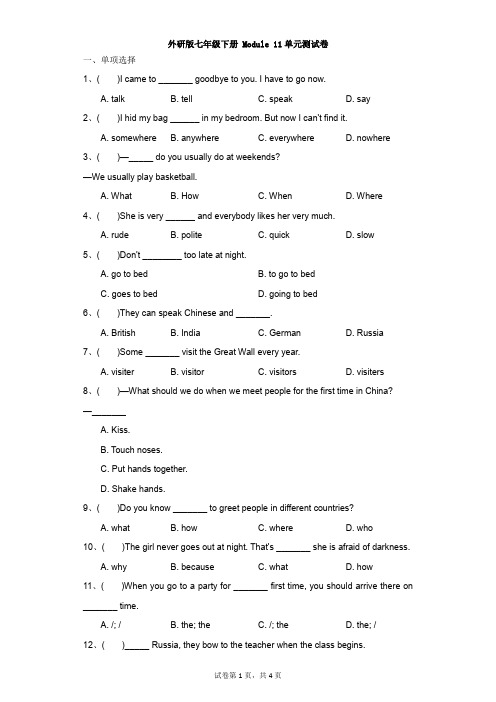
外研版七年级下册 Module 11单元测试卷一、单项选择1、( )I came to _______ goodbye to you. I have to go now.A. talkB. tellC. speakD. say2、( )I hid my bag ______ in my bedroom. But now I can't find it.A. somewhereB. anywhereC. everywhereD. nowhere3、( )—_____ do you usually do at weekends?—We usually play basketball.A. WhatB. HowC. WhenD. Where4、( )She is very ______ and everybody likes her very much.A. rudeB. politeC. quickD. slow5、( )Don't ________ too late at night.A. go to bedB. to go to bedC. goes to bedD. going to bed6、( )They can speak Chinese and _______.A. BritishB. IndiaC. GermanD. Russia7、( )Some _______ visit the Great Wall every year.A. visiterB. visitorC. visitorsD. visiters8、( )—What should we do when we meet people for the first time in China? —_______A. Kiss.B. Touch noses.C. Put hands together.D. Shake hands.9、( )Do you know _______ to greet people in different countries?A. whatB. howC. whereD. who10、( )The girl never goes out at night. That's _______ she is afraid of darkness.A. whyB. becauseC. whatD. how11、( )When you go to a party for _______ first time, you should arrive there on _______ time.A. /; /B. the; theC. /; theD. the; /12、( )_____ Russia, they bow to the teacher when the class begins.A. AtB. InC. OnD. With13、( )We can't _______ any food into the classroom.A. takeB. bringC. carryD. pull14、( )They walked to the park arm ______ arm.A. forB. byC. toD. in15、( )Our teacher came into the classroom______.A. with smileB. in smilesC. with a smileD. in a smile16、( )—______ should we do when we meet a Maori friend?—Well, touch noses, I think.A. HowB. WhatC. WhyD. When17、( )Jack, can you help me ________ the chair to the other side?A. nodB. moveC. touchD. wave18、( )It's ________ to say "thank you" for others' help.A. strangeB. badC. politeD. funny19、( )It's not ________ to laugh at other people.A. helpfulB. politeC. difficultD. interesting二、语法填空20、用所给词的适当形式填空—How many ______ (finger) do you have, Bob?—Ten.21、用所给词的适当形式填空In China, people often say goodbye by ______ (wave) their hands.22、用所给词的适当形式填空(1) Jenny hurt her two ______(foot).(2) May I ask you some ______(person) questions?(3) They don’t like others ______(stand) in front of them.(4) We know the UK ______(hold) the 2012 Olympics.(5) ______(be) careful! Here comes the bus.三、翻译填空23、在课堂上举手问问题是礼貌的。
外研版七年级下册英语module11bodylanguage模块测试题(及答案)
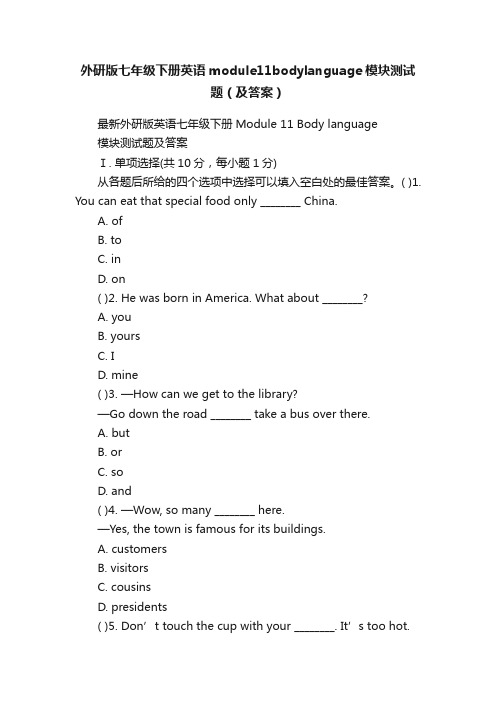
外研版七年级下册英语module11bodylanguage模块测试题(及答案)最新外研版英语七年级下册Module 11 Body language模块测试题及答案Ⅰ. 单项选择(共10分,每小题1分)从各题后所给的四个选项中选择可以填入空白处的最佳答案。
( )1. You can eat that special food only ________ China.A. ofB. toC. inD. on( )2. He was born in America. What about ________?A. youB. yoursC. ID. mine( )3. —How can we get to the library?—Go down the road ________ take a bus over there.A. butB. orC. soD. and( )4. —Wow, so many ________ here.—Yes, the town is famous for its buildings.A. customersB. visitorsC. cousinsD. presidents( )5. Don’t touch the cup with your ________. It’s too hot.A. fingersB. machinesC. eyesD. books( )6. —Are you learning ________?—Yes. I’m going to stu dy in ________.A. Russian; RussianB. Russian; RussiaC. Russia; RussianD. Russia; Russia( )7. It’s ________ to say “thank you” for others’ help.A. strangeB. badC. politeD. funny( )8. I saw him ________ a large box in his hands and enter the room.A. holdB. clickC. findD. choose( )9. Look at the man over there. He is ________ hands at us.A. drawingB. washingC. wavingD. watching( )10. —Can we start now?—________.A. GoodbyeB. Wait a minuteC. Please spell itD. Thank youⅡ. 完形填空(共10分,每小题1分)先通读下面的短文,掌握其大意,然后从A、B、C、D四个选项中选择可以填入空白处的最佳答案。
初中英语外研版七年级下册Module11 Body language单元练习含参考答案
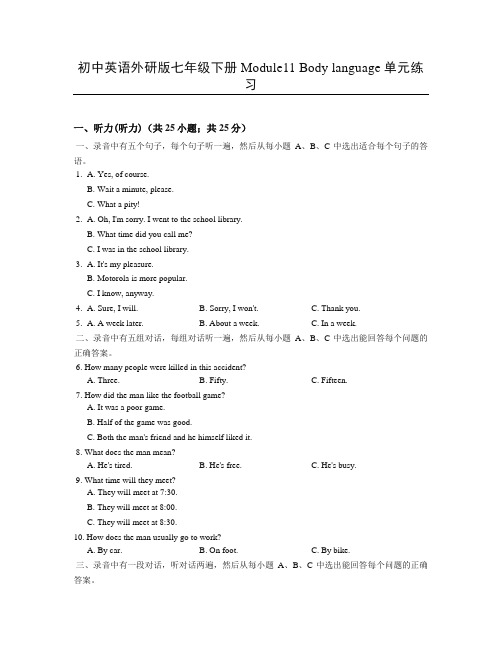
初中英语外研版七年级下册Module11 Body language单元练习一、听力(听力)(共25小题;共25分)一、录音中有五个句子,每个句子听一遍,然后从每小题A、B、C中选出适合每个句子的答语。
1. A. Yes, of course.B. Wait a minute, please.C. What a pity!2. A. Oh, I'm sorry. I went to the school library.B. What time did you call me?C. I was in the school library.3. A. It's my pleasure.B. Motorola is more popular.C. I know, anyway.4. A. Sure, I will. B. Sorry, I won't. C. Thank you.5. A. A week later. B. About a week. C. In a week.二、录音中有五组对话,每组对话听一遍,然后从每小题A、B、C中选出能回答每个问题的正确答案。
6. How many people were killed in this accident?A. Three.B. Fifty.C. Fifteen.7. How did the man like the football game?A. It was a poor game.B. Half of the game was good.C. Both the man's friend and he himself liked it.8. What does the man mean?A. He's tired.B. He's free.C. He's busy.9. What time will they meet?A. They will meet at 7:30.B. They will meet at 8:00.C. They will meet at 8:30.10. How does the man usually go to work?A. By car.B. On foot.C. By bike.三、录音中有一段对话,听对话两遍,然后从每小题A、B、C中选出能回答每个问题的正确答案。
- 1、下载文档前请自行甄别文档内容的完整性,平台不提供额外的编辑、内容补充、找答案等附加服务。
- 2、"仅部分预览"的文档,不可在线预览部分如存在完整性等问题,可反馈申请退款(可完整预览的文档不适用该条件!)。
- 3、如文档侵犯您的权益,请联系客服反馈,我们会尽快为您处理(人工客服工作时间:9:00-18:30)。
外研版英语七年级下Module 11单元测试题第Ⅰ卷(共75分)一、单项选择:选择最佳答案(重点难点全在这,看你的本领了)(35分)()1. Mike is from _____ , and he speaks _____.A. French, FrenchB. France, France.C. French,France.D. France,French.( ) 2. Can you ______ your sister to my party this evening ? I like her very much.A.giveB. bringC.wantD.take.( ) 3. My sister wants to go _______ this summer .A.somewhere coolB. cool somewhereC. anywhere coolD. cool anywhere( ) 4. Please ________ the door . It is too cold outside .A.don't openB. doesn't openC. openD. don't close.( ) 5. All my classmates like the new film, but I don't like it _______ .A. after all.B. at leastC. eitherD. at all.( ) 6. _______ this kind of peach and you will like it.A. To try.B. TryingC. TryD. Tries .( ) 7. The Smiths together with Mr. Wang ________ in that factory .A.work,.B.works,C. workingD.is working .( ) 8. I thought Betty was in the garden ,but __________she was in her room.A. in fact.B. in needC. in dangerD. in time.( ) 9. Jack , can you help me ______ the chair to the other side ?A. nodB.moveC.touchD. wave.( ) 10. — Don't be late again , Mike .---- ________.A. No , I don't.B. Don 't worry.C. Sorry , I won't.D. I don't know.( ) 11. ________Alan have a party last week?A. WasB. WereC. DoD. Did( ) 12. - When did you go there?- Three days_________ .A. lastB. agoC. nowD.after( ) 13. — What do you think of the book ? — _________ .A. It is about China.B. Very much.C. It is very interesting.D. It is 5 yuan .( ) 14. ---Did you ________ school on time ? ---No , we didn't.A. reachB.arriveC. getD.get in( ) 15. I am very tired now,, let 's sit down and have a .A.restB. dreamC. journeyD. question.( ) 16. The railway road goes______ the mountains.A.overB. underC. throughD.across.( ) 17. There is a bridge _______ the wide river .A. over.B.underC.acrossD. through.( ) 18. My house is ________ the train station . It is only ten minutes on foot.A.close toB. far fromC. near at.D.close with.( ) 19. There is _____space for a big bed in the room . The room is too small .A. littleB. manyC. muchD. few.( ) 20. — Thank you for your present . — ________ .A.It doesn't matter.B. Not at all.C. That's OK.D. The same to you.( ) 21. The girl started school the age of 6 .A.about.B. toC. onD. at( ) 22. I know a boy ________ Li Lei.A. callingB. to callC. calledD. calls( ) 23. China is famous ________the Great Wall.A.for.B. in.C. at.D. of.( ) 24. Mr. Smith came to China _________ his wife last year.A.andB.butC. withD. for( ) 25. Yang Liwei rested in the spacecraft two hours.A. forB. inC. atD. on.( ) 26.Betty with her parents _________ for a walk every day.A. goB. wentC. goesD.is going.( ) 27. When I was a small child, I enjoyed my mother’s fairy tales.A. listening toB. hearingC. listeningD. to listen to ( ) 28. Jack will __________London in three hours.A. arrive atB. getC. reachD. reach to.( ) 29. Did you enjoy ________ at the beach last weekend?A. yourB.youC. yoursD. yourself.( ) 30. We have PE class Monday and Friday.A.fromB. inC. atD.on( ) 31. You can go to the small island _______ .A. by boat.B. on boatC. by the boatD. by a boat.( ) 32. My parents_______ nice presents for me on my last birthday.A. sawB. boughtC. tookD. visited( ) 33. Please say hello ________ your parents when you get home after school.A.toB. forC. atD. in( ) 34. He does not have much money, he lives a happy life .A.soB.butC. becauseD.or.( ) 35. It takes me three hours ________ to the cinema.A.gettingB. to get.C. getD. got.二. 完形填空(10分)Long long ago there was a poor man . He had an apple tree in his garden.On the tree there there were many fine apples.One day he 36 one of his apples was much bigger than the others . It was as big as a football(和足球一样大)。
37 could ever seen such a big apple. The poor man 38 the apple to the king. The king was very happy 39 gave the man a lot of money 40 it. When a rich man heard of it, he said to 41 ,“it is 42 an apple. I will take the gold cup (金杯)to the king. He must give me 43 money. ”The next day when the king 44 the gold cup,he said to the rich man ,“what a beautiful cup! I will show you 45 .please take this great apple.”36. A. looked B.liked C. watched D.found37. A. Nobody B.Nothing . C. Any D.some38. A. took B brought C. had D.went39. A. that B. and C.but D.so40. A.on B. of C. to. D. for.41. A. the man B. myself C. himself D. you42. A. only B.very C.big D.good43. A.many B.lot C.most D.more.44. A got B.liked C.touched D. closed45. A. a nice thing B.some bread. C.some money D.some books.三、阅读理解(共20小题,计30分)阅读下面短文,并做后面的题目。
